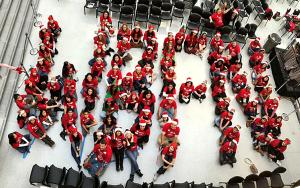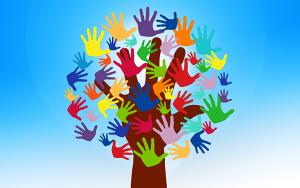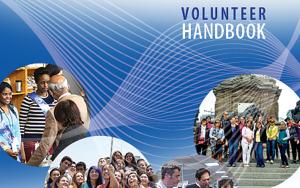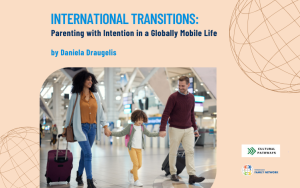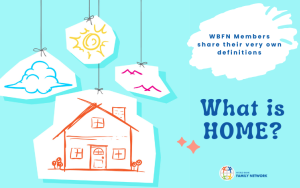
Identifying trends and finding solutions...
It was only in 1984 that work permits became available to spouses, thanks to WBFN’s strong advocacy. Since then, WBFN member demographics have changed significantly: the male to female ratio has increased, and the great majority of our members comprise dual-career families. WBFN identifies the trends and adapts its program to meet new challenges, like the WBFN’s basic support for job seekers that has developed into a full-fledged career advisory program.
As most WBG families are now dual career families, the Professional Development Program is continuosly improved to provide a wide range of services to assist WBG spouses and domestic partners in their career path. We offer job search workshops, webinars and resources, thematic skill building and information sessions, professional groups, volunteering and networking opportunities, self-employment and entrepreneurial opportunities and LinkedIn group for sharing job opportunities.
Broadening our horizons...
The Family Network has strenghtened support for our families worldwide. From the Overseas Briefing in the 1980s to today’s Worldwide Program, we have established a strong network of local chapters and expanded our serivices globally.
Today the Worldwide Program helps families connect with other families in more than 50 Country Office locations and provides ongoing support to help them with their transition.
One of our latest initiative is our pilot project in 3 select Country Office locations, India, Brazil and Ghana to deliver appropriate and effective assistance in terms of dual career and family support in the field. This pilot will determine the most important needs of the relocating families, identify shortcomings in the current support structure and offer appropriate solutions strategies that we will later expand on a global basis.
Celebrating 45 years
Main milestones
1972
- June 1972, is considered the birth date of the organization called WIVES (Women’s Information and Volunteer Services), when Mr. McNamara, the WBG President, officially recognized the organization, providing it with an office in the World Bank, an Office Administrator, and an activities budget of around $2,000.
- In the fall, “Opportunities and Information Services” is formed to support spouses in their efforts to obtain the right to work.
1973
- First elections are held to vote in the Executive Committee (EC) members. This governing body of the organization includes a Chair, a Vice Chair, and committee members.
- First Newsletter is published and translated into French, German and Spanish.
1974
- First Children’s Christmas party is held: 300 children attend.
- WIVES advocacy on behalf of Bank families starts, with EC initiating discussion with WBG Staff Relations about difficulties facing families, such as timing and duration of staff member’s travels or reports of families left without sufficient funds. First case of Domestic Abuse (DA) is brought to WBG management’s attention.
1975
- First WIVES Annual Meeting is convened.
1976
- IMF spouses request and receive permission from WIVES to use the information in the Welcoming kit prepared for newcomers by the Publication Committee.
1977
- The first UNICEF Christmas card sale takes place and is adopted as WIVES’ first charitable outreach.
- Youth Group Symposium on the role of the Bank.
1978
- The genderless term “Spouse” gains a foothold.
- The Children’s Committee brings mothers with young children together for support and networking.
- Chair of the EC attends the UN Women’s Forum in New York and reaches out to other UN and International organizations such as the IMF, IDB and PAHO as well as the State Department’s Foreign Service Women’s Association.
1979
- Spouse employment resurfaces as main concern of WIVES. The Bank begins to hire more female professionals and a few spouses were among them.
- Number of male spouses is on the rise.
1980
- Changes in the election process are implemented and the terms “President” and “Vice President” replace “Chair” and “Vice Chair”.
- WIVES decide to express its appreciation of the crucial role Mrs. McNamara played in forming and supporting the organization, by funding a scholarship in her name.
1981
- The Margaret McNamara Memorial Fund (MMMF) is launched to provide financial assistance for women from developing countries studying in the US, in a field related to women and children.
1982
- In June, the Book Project is established with the goal of sending books to schools in the developing world.
1983
- WIVES changes its name to WBVS (World Bank Volunteer Services).
1984
- The first MMMF Arts and Crafts Bazaar is held, and deemed a great suc¬cess.
- The Job and Career committee prepare a “how-to-do-it” document about obtaining a work permit.
1985
- The first Spouse Orientation program begins.
- An Overseas Briefing Handbook is prepared.
- WBVS makes it easier for spouses to get Bank ID cards. Advocacy efforts for spouse rights to medical insurance, pension benefits and protection from domestic abuse are prioritized.
1986
- The Representative Council, consisting of all the leaders of the different activity groups, is formed.
- The “WBVS International Cook Book” is published with proceeds benefiting the MMMF.
1987
- A major reorganization of the Bank creates a huge upset and high stress levels in Bank families. WBVS responds with a Forum in which Bank staff involved in the reorganization participate and answer spouses’ concerns regarding the reasons for the reorganization and its impact on family life.
1988
- WBVS doubles its efforts to help members deal with many issues such as visas, children’s education and adjustment, spouse retraining, recertification and language barriers.
- Domestic violence surfaces again, setting in motion the hiring of counseling services for families, (COPE) and FCS (Family Consultation Services).
1989
- First spouse “Skills Bank” database formed.
1990
- The first of five editions of WBVS’ “Yellow Pages” is published.
- Spouses become eligible for computer training and the use of the Bank-IMF Joint Library.
1991
- A Memorandum of Understanding between the Bank and WBVS is signed. It defines basic issues such as insurance coverage, areas of responsibility and financial coverage from the Bank.
- Spouses gain significantly more “rights”. Forms are developed that make it easier to access benefits information, but only with the Staff member’s permission.
- Insurance forms submitted by spouses are honored.
- The Bank grants divorced spouse partial payment for resettlement and shipment of household goods and studies possible changes in the rules, so divorced spouses can secure pension rights.
1992
- WBVS President participates in Bank discussions to formulate a Work / Family Agenda. The issues at stake: sick leave, dependent care, relocation, flextime, stress on the family due to extensive traveling schedules and spouse employment. The outcome is the creation at the Bank of the Family Career Transition Center and the Dependent Care Center.
- WBVS convenes the first Multi-Organization Meeting in which five multinational organizations and the State Department take part to share ideas and strategies for helping families cope with expatriate life.
1993
- The group PROD or Pension Rights on Divorce is born; its purpose is to rectify the spouse’s inequality when divorce occurs, especially after retirement.
- WBVS moves to larger offices, and starts the first monthly “Office Welcoming Coffee”.
1994
- The Executive Directors of the World Bank approve the staff retirement plan’s revisions, giving legally separated and divorced spouses of retirees, support payments from the Plan.
- WBVS Newsletter acquires a name: “Mosaic”.
- Another Bank re-organization with widespread redundancies, prompts another EC sponsored Forum for spouses and senior managers from HR to help clarify what is happening.
- A Youth Club is formed and publishes a magazine called “Fun Times”.
1995
- Support payment to separated and divorced spouses of retirees is implemented.
- PROD changes its name to SROD (Spouse Rights on Divorce).
- The Book Project relocates from a warehouse in Laurel, MD to the J bldg in Washington DC. This move prompts a noticeable increase in volunteers and shipments.
1996
- The MMMF reaches its fund raising goal of $600,000, and celebrates its 15th anniversary.
- The support group SROD, is expanded beyond divorce issues to deal with myriad concerns of all spouses and aptly renamed: Spouse Issues.
- The Bank undergoes another downsizing and reorganization and a concert¬ed push to hire younger staff, more females and more short-term consultants; thus changing the demographics of WBVS.
1997
- In response to the changing demographics of the Bank, WBVS extends its core activity of welcoming and family support to include families of consultants working at least six months at the Bank.
- Neighborhood Net, a new outreach program where newcomers are connected to other Bank families in their neighborhood, is started.
- The Welcoming Kit is expanded, updated and endowed with a colorfully designed hard cover.
- The Book Project celebrates its 15th anniversary and receives $10,000 from the IMF Civic Club.
1998
- The Bank’s legal department agrees to allow the Bank to “voluntarily” accept court orders from any court of legal jurisdiction from around the world.
- The Bank also agrees to “voluntarily” provide a spouse, the staff members’ Benefits information if the staff member doesn’t do so himself within 30 days of being served a court order.
- WBVS publishes “Planning Makes a Difference”, a manual on legal, financial, G-4 visa and bereavement issues affecting Bank spouses.
1999
- Following up on Mrs. Wolfensohn’s idea, that access to Benefits information should be the default state, WBVS starts uphill negotiations with both HR and the Staff Association.
- The bylaws are amended to shorten the President’s term to two years and to change the title of “Vice President” to “President-Elect.”
- It also opens WBVS membership to partners.
- Financial literacy training is given pro bono. The WBVS Financial Forum and two Financial Investment clubs are formed.
2000
- WBVS Career Task Force complements the services provided by the Bank’s Work/Life Services Unit.
- Domestic abuse issues are on the front burner again. Mr. Wolfensohn gives WBVS $50,000 to investigate the problem within the Bank community and educate spouses about their rights.
- WBVS launches its website.
2001
- A report on domestic violence is produced for Mr. Wolfensohn and HR senior management.
- Ten educational articles on domestic abuse are written and published in Mosaic and French, Spanish versions are prepared for IMF, PAHO respectively
- A brochure addressing domestic abuse is printed and stocked in all the Bank’s restrooms with GSD’s help.
- WBVS Financial Literacy Program begins.
2002
- The bylaws are amended to shorten the term of the President to one year.
- Creation of the Barry Mc Isaac Emergency Fund to aid spouses in dire situations.
- Fund raising expands to benefit Aschiana, a street children’s charity in Kabul, Afghanistan.
2003
- Staff Rule 2.01 is revised giving a spouse/ domestic partner access to Benefits information by default.
- After an updated WBVS status report, a Domestic Abuse Task Force is formed in conjunction with several Bank units (HR, HSD, Security, Ethics and Legal) and the HUB to begin assisting in DA cases.
- The first Small Business and Consultants Forum for job-seeking spouses/ partners is organized by WBVS.
- The first WBVS exhibition week takes place in the MC Atrium and aims to strengthen WBVS’ visibility within the Bank.
- WBVS changes its name to World Bank Family Network (WBFN).
- The Book Project celebrates achievement of its ‘Two Million Books’ goal.
2004
- The RSVP database is created to make resumes of spouses/partners and retirees more available to Bank hiring managers.
- WBG President’s Statement condemning DA, Amendment to Code of Pro¬fessional Conduct defines DA as staff misconduct
- Automatic “Spouse Alert” from HR enables WBFN to contact and welcome new Bank spouses/families directly.
- WBFN receives special recognition for its contributions to WBG families during the 60th Anniversary closing ceremony in the Atrium.
- The Memorandum of Understanding between the Bank and WBFN is revised and signed.
2005
- The Office of Ethics and Business Conduct honors WBFN with an award for its advocacy role on behalf of Bank families.
- A quilt in memory of Bank staff AIDS victims is sewn in collaboration with HSD and Bank staff and becomes a part of The Names Project AIDS Memorial Quilt.
- First Teen Symposium on adjustment to relocation; WBG President Wolfensohn gives Teens funds of $10,000 to use in participating in the Bank’s work.
- The first Teen Summer Program is implemented.
- First President’s Reception for Newcomers.
2006
- A Teen Development Workshop is organized at which WBG Teens learn about grant-giving and disburse the 2005 funds from President Wolfensohn.
- A Teen Programs Chair is created to address increased interest in programs for WBG teens.
2007
- A Spouse Career Symposium is organized jointly with the Family Associations of the IMF and IDB at which concerns on the topic are presented to the HRs of the WBG, IMF and IDB.
- The changed format, at the second President’s Reception for Newcomers, provides an opportunity for WBFN spouses/partners to directly express their experiences and concerns to President Wolfowitz.
- Taking into account the concerns of WBFN spouses and partners, particularly regarding employment, the Bank undertakes a reevaluation and restructuring of the Global Mobility/Work Life programs.
2008
- Career Symposium 2008: Paths to Career Growth is organized jointly with the Family Associations of the IMF and IDB and with the support of HR PAHO and the World Bank Global Mobility unit.
- Two changes in the 1998 WBG Policy: 1) the time period for a staff member to provide the Bank Group with evidence of compliance with his or her personal obligation as referred in the 1998 Policy, was shortened from 30 calendar days to 5 business days; 2) in case of repeated failure to make court-ordered spouse or child-support payments, a staff has 3 days to demonstrate to the Bank Group his/her compliance, before the Bank Group will authorize automatic deductions from the staff member’s salary.
- A new ESOL program run by WBFN for its members is piloted.
- An online newsletter “@-a-glance” is initiated.
- The first training course is held for volunteer facilitators of the WBFN online Financial Literacy courses.
- The first MMMF grants are awarded to students studying in the developing world.
- The Book Project celebrates its 25th anniversary and marks 3 million books shipped overseas!
2009
- Staff Rule 2.01 is revised removing the option whereby a staff member may block access by a spouse to the staff ’s salary and benefits (including pension and insurance) information.
2010
- WBFN presents jointly with HRSGM “Recipe for Success” at the FIGT (Families in Global Transition) Conference in Houston, Texas.
2011
- WBFN presents “WBFN as a Success Story” at the FIGT (Families in Global Transition) Conference in Washington DC.
- “Best Spousal Support Program” award by the Forum for Expatriate Management
2012
- Launch of first Local Chapter in Nairobi, Kenia
- Launch of Career and Volunteering program (Professional Development Program)
2013
- Launch of Youth Programs on Third Culture Kids awareness
2015
- Spouse employment included in Memorandum of Understanding between WBG HR and UNDP for talent sourcing
2016
- The CHP hosts more than 900 participants and is supported by more than 100 volunteers.
- WBFN starts 3 pilot projects in the Country Office of India, Brazil and Ghana to deliver appropriate and effective assistance in terms of dual career and family support in the field.
2017
- Launch of the new Career Lab specially designed for the globally mobile professionals who are seeking to continue or reestablish their careers.

